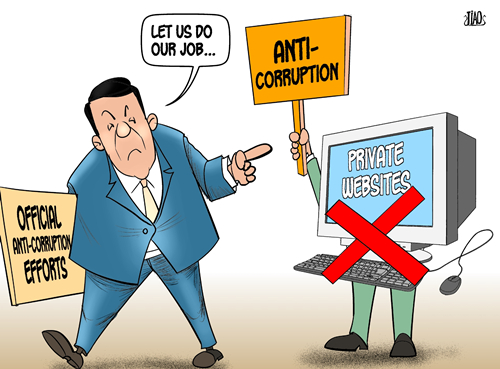New strategy urged in fight against corruption
 0 Comment(s)
0 Comment(s) Print
Print E-mail
China.org.cn, July 1, 2011
E-mail
China.org.cn, July 1, 2011
 |
|
Let them do their job [By Jiao Haiyang/China.org.cn] |
Having attached much importance to clean governance, the Communist Party of China (CPC) has remained committed to fighting corruption over the last 90 years.
In the new millennium, Chinese President Hu Jintao has said that the system for preventing and punishing corruption in China should be adapted to suit the socialist market economy. This is the first time that anti-corruption, along with ideology, organization, work style and institutions, has been made one of the basic tasks of the Party's construction.
China.org.cn spoke with Wang Minggao, vice chairman of Hunan University of Commerce (HUC), an expert on anti-corruption, on how best to crack down on corruption today.
China.org.cn: Corruption is very common around the world. Anti-corruption campaigns show that the problem can only be curbed, not eradicated. What are reasons for this persistence?
Wang Minggao: First, mankind has imperfect natural instincts. People's desires to control and dominate are the foundation of power as well as the root of corruption.
Second, some components of power can lead to corruption because they are compulsory, dominant and expansionary as well as random. Those factors can make power expand viciously when there is no efficient external restriction on it. As the British historian Lord Acton said: "All power tends to corrupt and absolute power corrupts absolutely."
Third, a handsome payoff can be a catalyst of corruption. Most human behaviors are in pursuit of profit maximization. As Karl Marx wrote in Das Kapital: "With adequate profit, capital is very bold. A certain 10 percent will ensure its employment anywhere; 20 percent will produce eagerness, 50 percent positive audacity; 100 percent will make it ready to trample on all human laws; 300 percent, and there is not a crime at which it will scruple, nor a risk it will not run, even to the chance of its owner being hanged." The evolution of corruption follows the same route.
China.org.cn: As an advocate of anti-corruption campaigns, why do you believe that China can curb corruption by laws and rules?
Wang Minggao: Corruption has its social and ideological reasons, and the most important among them was that there had not been an effective mechanism to check and supervise those in power, as the late Chinese leader Deng Xiaoping put it.
Laws and regulations for power restriction and supervision geared to the socialist market economy have not been established in China. But executive power is still authorized to allocate social resources under the market economy, so widespread corruption is inevitable.
Deng believed that anti-corruption laws and regulations is a permanent cure. He argued that "a good legal system can limit bad behaviors, while a bad system ruins good behaviors and even turns them to the opposite." To carry out an effective anti-corruption policy, each CPC member and official should be required to work according to laws and regulations, and there should also be an efficient and strict supervision mechanism to ensure compliance. Only the legal system can ensure proper supervision.
China.org.cn: Why do the CPC's anti-corruption campaigns produce little effect?
Wang Minggao: First, there is no effective mechanism for checks and balances in China. Lots of departments have the right to make laws. Departments only focus on their own interest and power and neglect their responsibilities when legislating or issuing regulations. Moreover, they naturally evade the checks that are in place, which provide too many loopholes for corrupt officials.
Another reason is that legal provisions governing corruption are not systematic. Although there are more than 1,200 provisions and documents in China regarding corruption, they are scattered in various laws and regulations concerning crime, administration and economics. Some of them are even contradictory to one another. It's not easy to implement these regulations and laws in practice. Systematic loopholes have also diminished the credibility and authority of laws and reduced the effectiveness of anti-corruption efforts. There must be a law on anti-corruption as a guideline to direct implementation of such policies.
Second, the laws and regulations are difficult to carry out. A law's value depends on the quality of its enforcement. Without proper administration, the best legal system is only empty words. Lack of effective enforcement has caused few corrupt officials to be caught in recent years and more and serious corruption to occur.
On the whole, in order to enhance anti-corruption, we must improve the quality of the legal system and the rigidity of enforcement, putting better standards into meaningful law.






Go to Forum >>0 Comment(s)